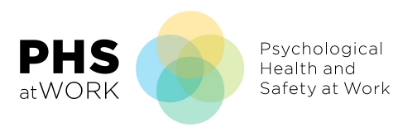WHY IS PSYCHOLOGICAL HEALTH & SAFETY IMPORTANT?
Legal: Emerging legal and regulatory mandates articulate employer responsibilities
The provision and maintenance of a psychologically safe workplace is recognized as a legal duty. Similar to the duty to provide a physically safe workplace the employer must take every reasonable precaution to protect employee psychological safety and show that they have done so.
Employer Responsibilities:
The concept of mental health must be distinguished from the concept of mental illness. For example, a person may have good mental health and have a diagnosed mental illness. Consequently, a person may have no diagnosed mental illness but may be dealing with significant mental distress. Mental distress can present on a continuum of sadness to subclinical depression and anxiety as well as severe demoralization, disengagement, and alienation.
Another concept is mental injury. The defining aspect of mental injury is that responsibility for it in whole or in part is a result of something outside the person's control. The mental injury involves harm to a person that results from someone else’s negligent, reckless or intentional conduct. When such conduct occurs in the workplace, the employer is liable.
Mental distress observed in the workplace can be a result of a breakdown within the Psychological Health and Safety Standards. Working in a Respectful and Civil Workplace Cultures is an identified psychological need. Research has shown that one of the key workplace hazards negatively impacting organizations today is unmanaged interpersonal conflict within the workplace (Gilbert M & Bilsker D, 2012). Conflict is a natural phenomenon occurring between people in all kinds of human relationships. When managed improperly, conflict can escalate to harassment and or violence impacting organizational productivity, operational effectiveness, morale and employee health (Kelloway & Barling 2010).
Employers have different kinds of responsibilities concerning mental distress, mental injury, and mental illness.
Understanding the accountability of employees and the employer is critical to moving forward. Most important is engaging in a New Standard of Conduct within the Workplace
Ensuring psychological safety calls for a standard of conduct at work that requires people to treat one another with fairness, civility and respect regardless of their power or status within the organization.
The range of conduct accountable to legislation has grown considerably. It is important to recognize that there is a continuum of unacceptable workplace behaviours and expectations that range from rudeness to harassment and, in the extreme, violence. The overall effect of the new legal standards is that types of conduct that would most likely have been tolerated in the workplace five years ago are no longer acceptable to the majority of judges and arbitrators. Given this, it is in all our best interest to act in a manner that prevents the risk to employees and the possible legal consequences.

